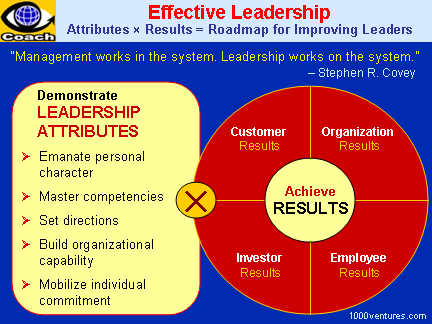
Know Why
Start a business when you have a passion for something and want to create something that you can be proud of. Inspire your people with a clear vision. Define shared values and let values rule. Build your distinctive corporate capabilities to achieve competitive advantage.
Know What
Finding the right balance in your business will help you refine your goals and hasten you towards them. Organizations prosper by achieving strategy through balancing the four major factors or perspectives: Financial; Customer; Process; and Growth.
Know Where
Remember the old joke about the car mechanic who's called in after every other mechanic failed? He listens to the engine for a few minutes, then hauls off and gives it a big swift kick in a certain strategic spot. Lo and behold, the engine starts humming like a kitten. The mechanic turns around, gives the car owner his bill for $400 and the price breakdown: '$1 for my time, and $399 for knowing where to kick.'
Know When
Timing is everything. You have to know not only how to make a move, but when. "The value of actions lies in their timing," said Lao Tzu. Customer value derives from timely delivery. Change is unavoidable, but if you can anticipate it and understand business cycles, you can ride with change instead of being run over.
Know Who
"In the end, all management can be reduced to three words: people, product, and profits. People come first," said Lee Iacocca Your corporate vision is worthless, strategies powerless and shared values are corrupt without the right people to execute.
Know How
Manage processes, not people. Focus not on what they do, but on how they do it. Establish a synergistic enterprise-wide and an end-to-end (cross-departmental, and often, cross-company) coordination of work activities that create and deliver ultimate value to customers.

"Leadership is the art of getting someone else to do something you want done because he wants to do it." – Dwight D. Eisenhower
Leadership Defined
Leadership is the process of directing the behavior of others toward the accomplishment of some common objectives. It is influencing people to get things done – willingly! – to a standard and quality above their norm to achieve a shared stretch goal. As an element in social interaction, leadership is a complex activity involving a process of influence; actors who are both leaders and followers, and a range of possible outcomes – the achievement of goals, but also the commitment of individuals to such goals, the enhancement of group cohesion and the reinforcement of change of organizational culture.
What is Leadership? Three simple one-line answers by Paul Taffinder
-
The easy answer: leadership is getting people to do things they have never thought of doing, do not believe are possible or that they do not want to do.
-
The leadership in organizations answer: leadership is the action of committing employees to contribute their best to the purpose of the organization.
-
The complex (and more accurate) answer: you only know leadership by its consequences – from the fact that individuals or a group of people start to behave in a particular way as result of the actions of someone else.
Effective Leadership as a Source of Competitive Business Advantage
Leadership is imperative for molding a group of people into a team, shaping them into a force that serves as a competitive business advantage. Leaders know how to make people function in a collaborative fashion, and how to motivate them to excel their performance. Leaders also know how to balance the individual team member's quest with the goal of producing synergy – an outcome that exceeds the sum of individual inputs. Leaders require that their team members forego the quest for personal best in concert with the team effort.
Super-leaders help each of their follower to develop into an effective self-leader by providing them with the behavioral and cognitive skills necessary to exercise self-leadership. Super-leaders establish values, model, encourage, reward, and in many other ways foster self-leadership in individuals, teams, and wider organizational cultures.





No comments:
Post a Comment